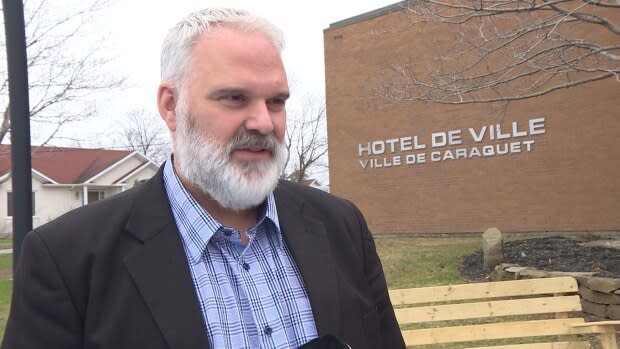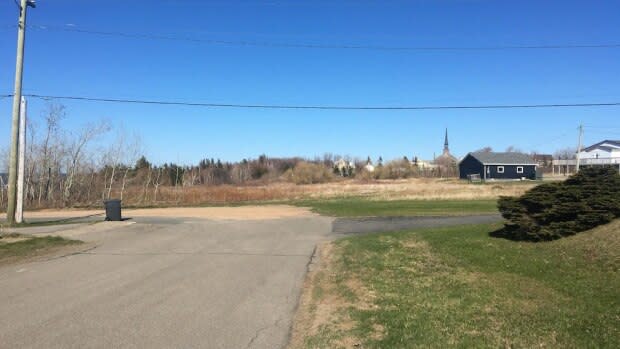Provincial court judge makes waves opposing waterfront development near her home
A provincial court judge has "raised some eyebrows" by publicly opposing a waterfront residential development near her home in Caraquet, arguing it will create too much traffic.
Judge Johanne Landry wrote a letter to Caraquet council about the 24-unit project proposed by DuParc Real Estate Group, an affiliate of Foulem Construction.
She urged council to cancel the rezoning hearing for the project, suggesting it violated the province's COVID-19 state of emergency declaration.
And when the meeting went ahead on May 11 via Zoom and YouTube, Landry teleconferenced in to speak against the project, called Faubourg de la mer.
"That kind of raised some eyebrows," said Mayor Kevin Haché.

Judicial conduct, both in and out of the courtroom, is subject to public scrutiny because a judge's impartiality and integrity play an important role in the public's confidence in the judicial system.
Landry did not identify herself as a judge in her letter or at the meeting, but "it's a small community," Haché said. " Everybody knows everybody.
"She was calling as a citizen but of course, you know, can you separate the judge from the person, or the person from the judge? I guess that is the question."
Haché, who is a lawyer, declined to offer an opinion about Landry's actions, saying he might have to appear before her in court one day.
Tricky balance
Richard Devlin, a professor at the Schulich School of Law at Dalhousie University, said judicial conduct is a complicated issue.
Judges don't give up their citizenship rights, but they do have to think about how they assert those rights, he said.
"Just because you're a judge doesn't mean to say you're not allowed to have a voice in your community.
"The concern, however, is that a judge may be using their status as a judge to reinforce their position, or to create an impression that there is only one way to go about things."
There's no sort of silver bullets here. There are no bright lines. - Richard Devlin, law professor
The challenge, said Devlin, is to find the right balance. That can be particularly "tricky" in small communities.
The objective test that's normally applied, he said, is whether the judge's actions, in the eyes of a fully informed and reasonable person, would bring the administration of justice into disrepute.
"There's no sort of silver bullets here. There are no bright lines. It's a very ad hoc decision-making process."
Guidelines for federal judges
Federally appointed judges have a 60-page document, titled Ethical Principles for Judges, to guide them.
It advises "avoidance of public participation in controversial political discussions." But it goes on to acknowledges this is "more open to debate and problems" than other principles.

"In defining the appropriate degree of involvement of the judiciary in public debate, there are two fundamental considerations," the document says.
"The first is whether the judge's involvement could reasonably undermine confidence in his or her impartiality.
"The second is whether such involvement may unnecessarily expose the judge to political attack or be inconsistent with the dignity of judicial office. If either is the case the judge should avoid such involvement."
Only a couple of provinces, Ontario and Quebec, have guiding principles for their judges, said Devlin.
No provinces have a code of conduct for judges, he said.
There is, however, case law to turn to.
Landry, who was appointed to the bench on June 1, 2017, did not respond to a request for an interview.
Chief Judge Jolène Richard of the provincial court did not respond to a request for an interview either.
2nd rezoning vote today
Caraquet council voted in favour of rezoning to allow the proposed development, despite the objections of Landry, at least two local lawyers — Judy Begley, who co-signed the letter with Landry, and Charles R. LeBlanc — and other area residents.
"There's a demand for these kinds of [units] in the community and weighing the against and the for, [council] decided the project should go ahead," said Haché.
Second and third reading are scheduled for later Monday, he said.
In their May 6 letter, Landry an Begley argued council should not have launched the rezoning process, which requires public consultation, during the COVID-19 pandemic.
'Statutory obligation' to delay
They cited the province's state of emergency declaration, which says: "On the recommendation of the Attorney General, retroactive to March 19, 2020, the operation of the provisions of any act, regulation, rule, municipal bylaw or ministerial order that establish limitation periods for commencing [or for taking steps in] any proceeding before a court, administrative tribunal or other decision-maker is hereby suspended."
Landry and Begley told council they believed the public meeting could not proceed until at least 21 days after the end of the state of emergency. "We ask you to confirm that the town is aware of this statutory obligation, and that the town intends to comply with it."

Without the delay, "the balance will tip in favour of the project promoters at the expense of those who will have to live with the consequences for years, even decades," they argued.
The physical distancing requirements make it extremely difficult for citizens, including those who live in the roughly 50 homes in the Haché-Legarrec-Rioux neighbourhood of the proposed project, "to meet to consult, discuss, and get organized.
"We are therefore at a distinct disadvantage in our efforts to prepare our best possible submissions to the city and to decision makers."
In addition, some residents don't have the internet to access the public hearing via Zoom or YouTube, or may not know how to communicate by video conference, they said.
Telephone access doesn't allow "full and equitable" participation, they argued, because people on the phone can't see or be seen, and may have difficulty hearing and discerning who is speaking, when.
Council checked with the town's legal counsel and the province before holding the meeting, according to the mayor. "They told us we were OK," said Haché.
Would have broad implications
The Francophone Association of Municipalities of New Brunswick requested clarification from the province, said executive director Frédérick Dion.
"We understand that this situation could lead to a legal challenge. So, to avoid wasting everyone's time, we simply asked the province to clarify the decree that was adopted."
Landry and Begley's interpretation would have significant consequences for all municipalities, he said, because "it implies that the municipality would not have the powers to act."

The Department of Justice and Office of the Attorney General did not respond to a request to clarify whether the state of emergency could void Caraquet council's rezoning decision, as Landry and Begley had suggested.
But on Friday the declaration was amended. It now states: "For greater clarity, this paragraph does not affect the normal operation of municipal or local government or of community planning activities."
Proposed compromise
Landry and Begley contend the proposed development will increase traffic by 50 per cent on their neighbourhood's quiet, narrow streets, which have no sidewalks.
In their letter, they raise concerns about pedestrian and cyclist safety, as well as snow removal and flooding.
They said they consulted with the residents of nine other homes and all 16 of them are in favour of a residential development, but with fewer than the proposed 24 units.
At least 15 people are opposed to the proposed extension of their street, Legarrec, they said.

Instead, they propose a compromise. They contend the existing zoning and space could accommodate up to 16 units and the project could be accessed from Saint-Pierre Boulevard west, which is equipped to handle the increased traffic and has sidewalks.
Denis Foulem of Foulem Construction did not respond to a request for an interview.
The mayor said council considered all possibilities, but the request for the project was for 24 units, which was deemed reasonable. There is space and there is a need for the housing, said Haché.
Without the Legarrec Street extension, he said, an extra road would be required, which would make the project too expensive.


